Key takeaways:
- Decentralized exchanges (DEXs) allow direct peer-to-peer cryptocurrency trading, enhancing user privacy and security by keeping funds in personal wallets.
- DEXs use blockchain technology and smart contracts to facilitate transparent and efficient transactions without intermediaries, improving trade accessibility and reducing delays.
- Despite their benefits, DEXs carry risks such as lack of regulation, smart contract vulnerabilities, and potential liquidity issues, requiring users to conduct thorough research.
- Community engagement and shared learning experiences can significantly enhance users’ understanding and strategies in navigating decentralized finance.
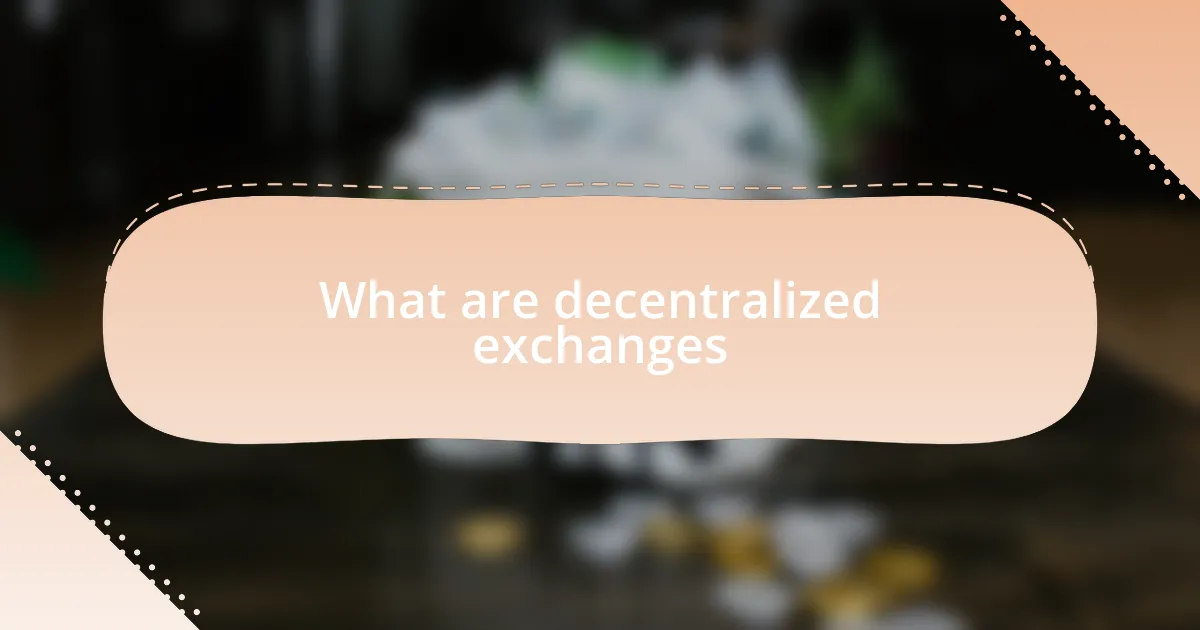
What are decentralized exchanges
Decentralized exchanges (DEXs) are trading platforms that operate without a central authority, allowing users to trade cryptocurrencies directly with one another. This peer-to-peer approach not only enhances privacy but also reduces the risk of hacks that often plague centralized exchanges. When I first used a DEX, the thrill of directly interacting with other users made me realize how liberating it felt compared to the traditional systems.
In essence, DEXs empower users by giving them complete control over their funds. This means you’re not just a spectator; your assets remain in your wallet until the trade is executed. I remember feeling a sense of security knowing my funds weren’t held hostage in a centralized server, a stark contrast to the anxiety I experienced with traditional exchanges.
What I find particularly fascinating about decentralized exchanges is their ability to facilitate trades without intermediaries. Isn’t it remarkable that technology allows us to transact directly with each other? This innovation not only enhances efficiency but also democratizes access to trading opportunities, which is something I wholeheartedly believe we should embrace.
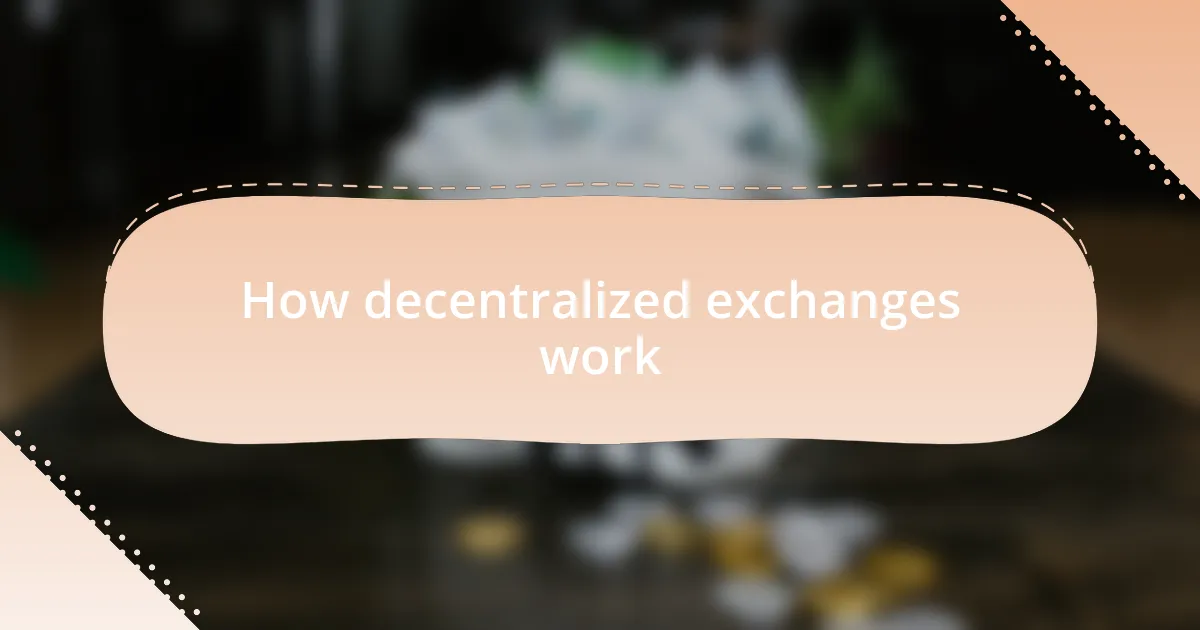
How decentralized exchanges work
Decentralized exchanges operate on blockchain technology, which allows for transparent and secure transactions. Each trade is executed through smart contracts—self-executing agreements with the terms directly written into code. The first time I interacted with a smart contract, it felt like stepping into the future; it was amazing to see how code could automatically enforce trades without any need for trust or oversight.
The matching of buy and sell orders occurs on the blockchain, rather than a centralized order book. This process means that users can conduct trades at any time, free from restrictions that traditional exchanges often impose. I remember when I attempted to make a trade on a centralized platform during peak hours and got frustrated by the lag. With a DEX, that kind of delay and inconvenience feels like a relic of the past.
Liquidity in decentralized exchanges is often boosted by liquidity providers, who contribute their assets to earn rewards. They’re essentially incentivizing the network to ensure sufficient trading volume is maintained. I think about the first time I provided liquidity; it was exciting to feel like I was part of a bigger ecosystem that empowers not just me, but the entire trading community. Isn’t it inspiring to know that everyone can take part in creating a more robust trading atmosphere?
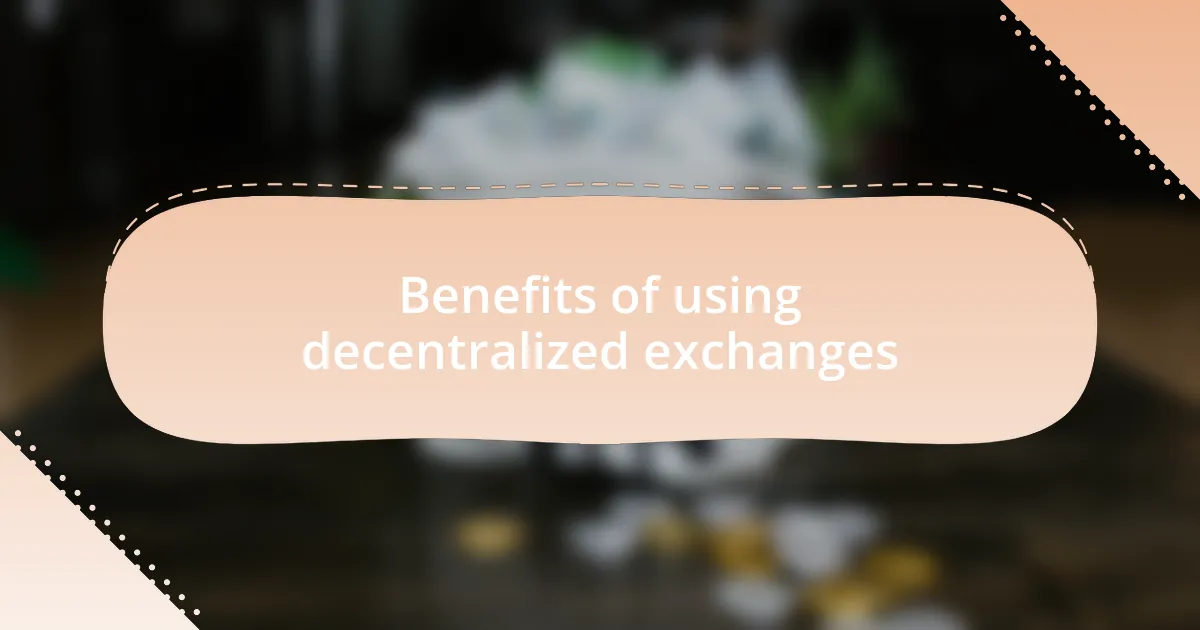
Benefits of using decentralized exchanges
Decentralized exchanges offer greater privacy and control over your funds compared to traditional platforms. When I first transitioned to using a DEX, I was struck by how liberating it felt not to share my personal information for trading. It made me appreciate the empowerment that comes from retaining full ownership of my assets while navigating the decentralized landscape.
Another significant benefit is the reduced risk of hacks or fraud. Since DEXs operate without a central authority holding user funds, the potential for large-scale exchanges to be compromised is dramatically minimized. I recall reading about high-profile hack incidents in centralized exchanges and feeling a sense of relief knowing my assets were secure when I switched. Isn’t it reassuring to trade knowing you’re less vulnerable to those colossal breaches?
Moreover, trading fees on decentralized exchanges are often lower since they bypass intermediary costs. Initially, I was taken aback by how much I could save on transaction fees, especially when I regularly engaged in frequent trades. This efficiency fosters a more cost-effective trading environment, which benefits traders like me who are looking to maximize their investment returns. How often have you felt frustrated by exorbitant fees eating into your profits?
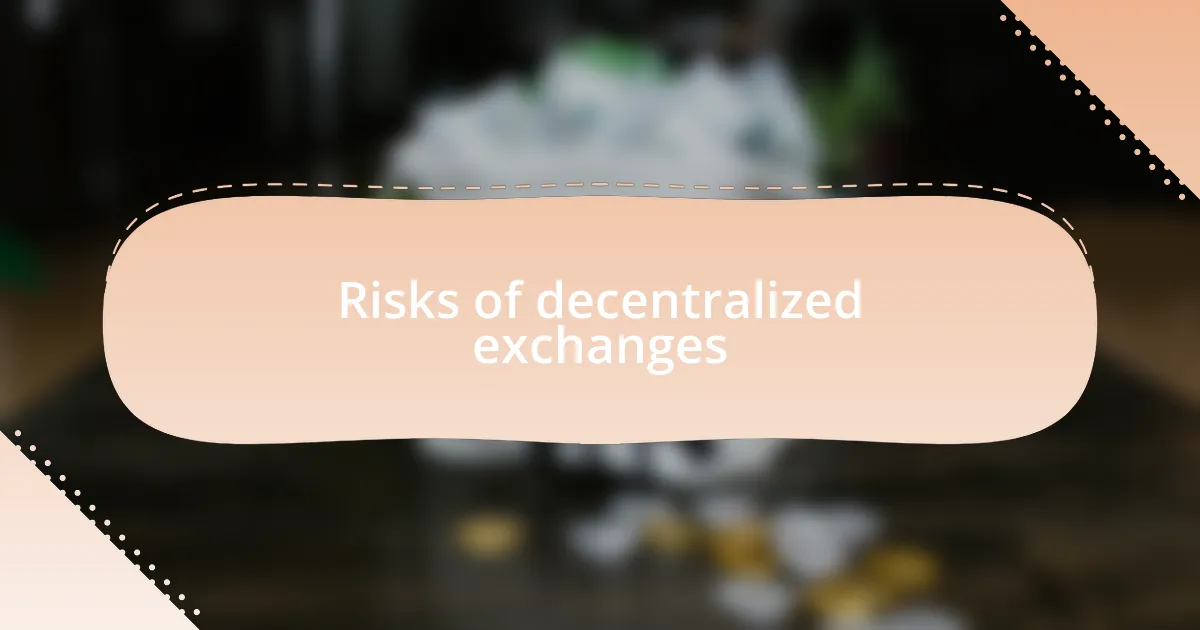
Risks of decentralized exchanges
When it comes to decentralized exchanges, the lack of regulation can be alarming. I remember one time when I encountered a DEX with a promising interface and numerous trading pairs, only to discover it lacked basic security measures. Have you ever thought about how easily a malicious actor could create a deceptive platform? It became clear to me that while I enjoyed the autonomy, I had to be vigilant.
Another risk I’ve noticed is the potential for smart contract vulnerabilities. During my explorations, I came across a DEX that had previously experienced a major exploit due to a coding flaw in its smart contract. This incident left many users with significant losses, making me realize the importance of researching a platform’s technology before diving in. Isn’t it essential to ensure that the tools we trust are built on solid foundations?
Finally, liquidity can be an issue on decentralized exchanges. I’ve found that trading smaller or newly launched tokens sometimes leads to slippage, meaning I don’t get the price I expect when executing trades. This frustrating experience taught me that while DEXs can offer excellent opportunities, I still need to be strategic and mindful of which assets to trade, especially when liquidity seems thin. Have you ever faced a similar challenge? It certainly makes you think twice about your trading strategies.
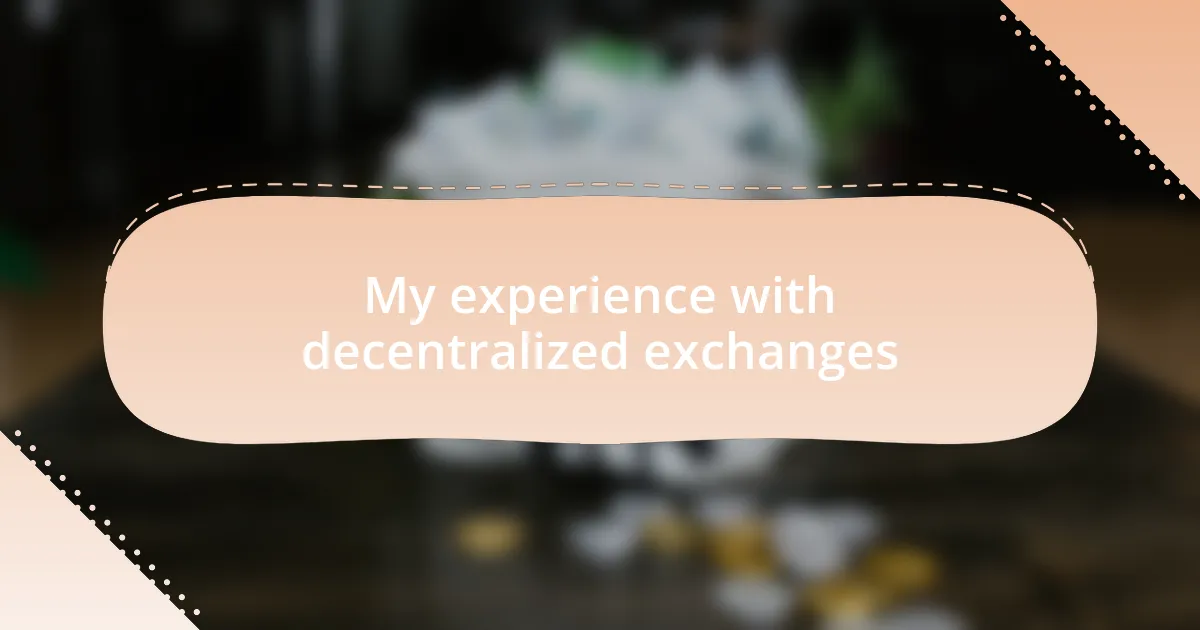
My experience with decentralized exchanges
Navigating decentralized exchanges has been quite the adventure for me. I recall my first experience trading on a DEX where I was drawn in by the promise of anonymity and lower fees. However, there was a moment of sheer panic when I mistakenly clicked on a wrong token and found myself holding a worthless asset. It’s fascinating how one click can drastically change your trading journey, isn’t it?
One aspect that truly stood out during my time with DEXs was the community involvement. I participated in a forum where users shared their strategies and experiences, and it was thrilling to feel part of a collective effort to educate each other. Each story, whether of triumph or failure, always sparked discussions that helped me fine-tune my approach. Have you ever found yourself learning more from others than the platforms themselves?
I also remember the rush of using various DEXs for yield farming. The excitement of earning passive income was intoxicating, but I quickly learned to thoroughly vet the projects before committing my assets. It was eye-opening to see how many had short-lived offerings, leaving investors in the lurch. This realization made me appreciate the necessity of due diligence in the ever-evolving world of decentralized finance. Have you ever experienced that mix of thrill and anxiety in pursuing potential rewards?